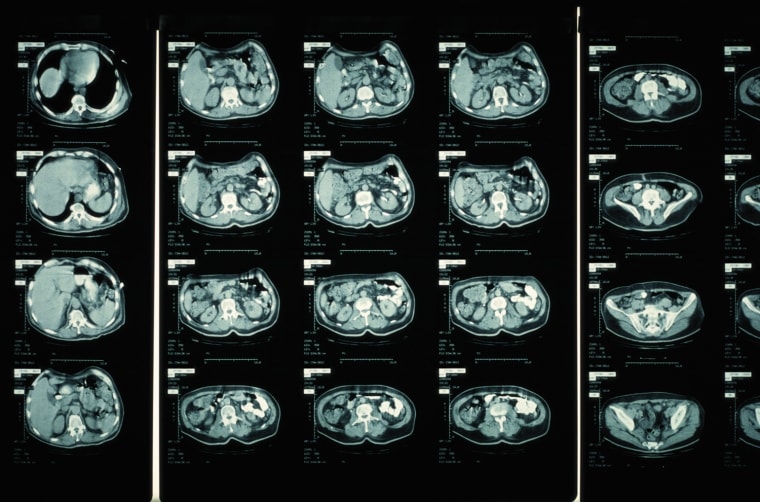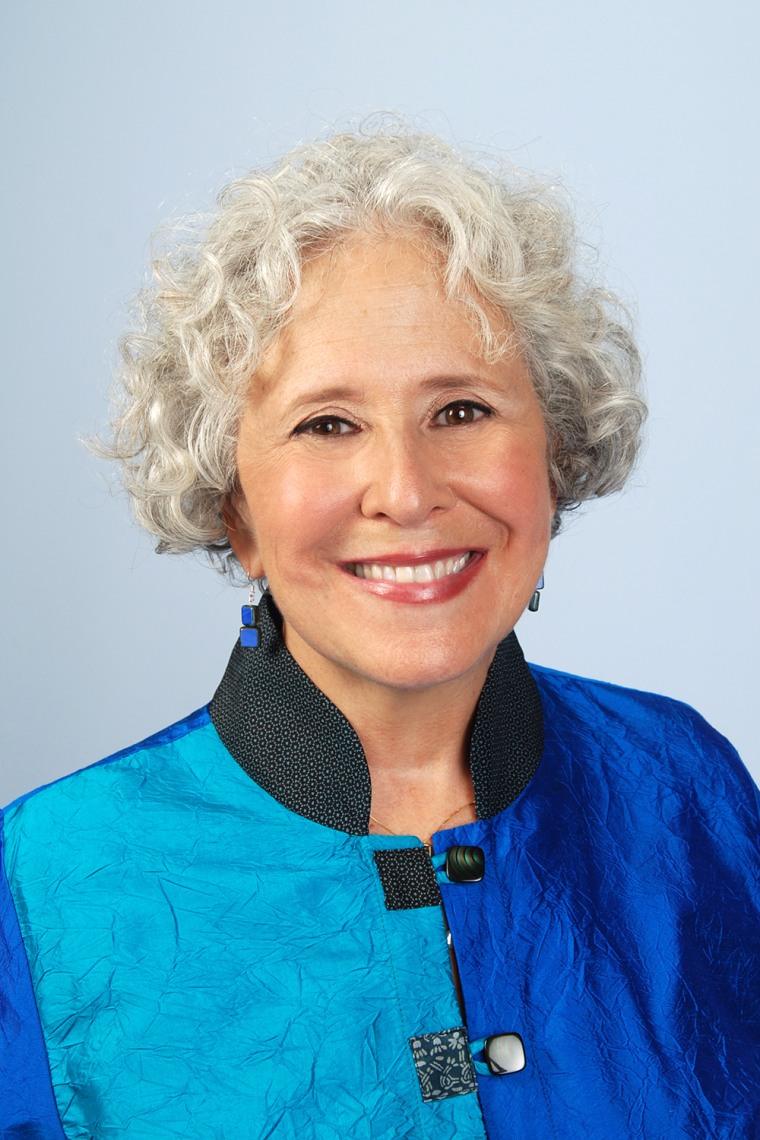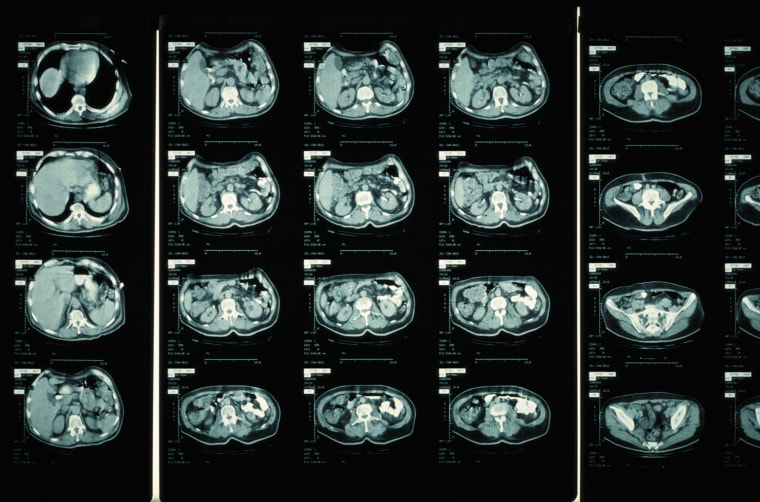
Everyone’s heard a story: Someone got an MRI for a sports injury or dizziness and the radiologist found a tumor, just in the nick of time. Or maybe it was an aneurysm, just about to burst. Lives were saved. It was great luck.
Some of the stories are dramatic. Joan Rachlin of Boston got what seemed to be a routine Pap smear 27 years ago. Like most Pap smears, it was deemed normal. “I got a call something like seven months later from a gynecological pathologist at Brigham and Women’s Hospital in Boston,” Rachlin told NBC News.
“He was doing research on Pap smear tissue and he had come across mine. He discovered that my Pap smear had been misread and that, in fact, I had a cancerous lesion.”
It’s what’s called an incidental finding — the researcher, who Rachlin says does not wish to be named, was studying something else and in fact had to go to some trouble to match the sample to a real person. “He thought my Pap smear had really been so poorly interpreted that my life was in danger,” said Rachlin, who is executive director of Public Responsibility in Medicine and Research. “I am alive today because a very, very conscientious researcher had read my Pap and decided to break the code and find me.”

There were no guidelines — the researcher just went rogue. More checks showed Rachlin did indeed have cancer, but it was early stage and surgery took care of it.
Today whole industries are building up around the possibility that a test will find a medical problem that was just about to kill you. The latest entry — whole genome tests that promise to detail your medical future in a drop of spit.
But it’s starting to become clear that not all these findings are lifesaving, and some can be downright harmful. Take the case of the elderly woman whose chest lung X-ray showed what looked like lung tumors. She had a biopsy done — a tricky procedure that involves poking a long needle through the chest wall, or sending a bronchoscope down into the delicate lungs. Her lung collapsed and she died. The tumor, it turned out, was harmless. Were it not for the scan, she would have still been alive.
Her case is outlined in a report issued last month by the Presidential Commission for the Study of Bioethical Issues.
Or what about Dr. Danielle Ofri, who teaches at New York University School of Medicine, who had to deal with the fallout from another case? “I had a patient who had suffered abdominal pain forever,” Ofri told NBC News.
The patient, whose English is poor, has gastritis, high blood pressure, acid reflux, diabetes and a variety of other chronic pains. “I don’t think she has anything significant,” Ofri said.
One weekend, the patient panicked and went to the emergency room. “Of course they scanned her belly,” Ofri said. The scan showed something called an adrenal mass. “Adrenal glands often have benign tumors,” Ofri said. “They are never noted unless you do a CT scan for other reasons.”
Only about 15 percent are doing something harmful, like causing the adrenal gland to underproduce hormones.
But now, in addition to managing the patient’s chronic conditions, Ofri had to address this mass, which she was certain was harmless but which was unnerving the patient. “Everything else was fine. Her stomach was fine, her intestines were fine,” Ofri said. “But now her other problems got short shrift.”
“Most people may think on the face of it, why wouldn’t you want to know something more about your body and your health?” said Amy Gutmann, a political science and philosophy professor who heads the bioethics commission. “But there’s a wide variety of reactions of people to incidental findings. Some people want to know them. Other people don’t.”
The tests that Ofri needed to order to check out the mass were expensive, and required the patient to take some complicated steps. “She got so befuddled by the instructions that it fell apart,” Ofri said. “I decided to let it lie. I decided the risks outweighed the benefits. The cost, the time, the distraction from other medical issues wasn’t worth it. We don’t have four hours to spend with each patient.”
As more and more tests become available and standard, from MRIs to CT scans, to genetic tests and ultrasounds, these issues will come up more often. There’s even a name for these often harmless tumors that get discovered — they’re called incidentalomas.
For instance, 10 percent of brain scans and more than 30 percent of abdominal CT scans turn up something that doctors weren’t looking for and that may need more tests, says Dr. Stephen Hauser, who heads the neurology department at the University of California, San Francisco and who helped lead the Bioethics Commission panel in its report on the issue.
“Managing incidental and secondary findings is an issue that has the potential to touch many of us as we seek medical care, participate in research, and even send a cheek swab to a company for a peek at our own genetic make-up,” the commission says in its report.
“The reality is that you or a loved one just might find out more than you bargained for. Yet practitioners are getting conflicting advice about how to manage such findings across contexts and modalities such as genetics, imaging, and biological specimen testing.”
And there is little guidance for doctors who may be the first to make these discoveries. “There are no consistent guidelines for how we best manage these issues,” Gutmann told reporters.
Clearly, a Pap smear that shows an aggressive cancer or an MRI that shows a malignant brain tumor are easy calls. But what if someone has a gene that makes them likely to develop an untreatable disease?
Some groups are coming out with guidelines. The American College of Medical Genetics and Genomics lists specific conditions that might pop up on a genetic test that require more testing and a report to the doctor who ordered the test. Some examples -- mutations in the BRCA genes that raise the risk of breast and ovarian cancers.
More such guidance is needed, the bioethics commission says. Professional groups need to write up specific recommendations for accidental findings that are likely, and what, if anything, should be done when they are made. Doctors need guidelines for talking to patients about what might come up on a test before it’s done, and doctor and patient should agree on what the patient wants to be told.
“We know the difference between night and day,” Gutmann said. “That doesn’t mean there aren’t difficult issues of dusk and dawn.”
